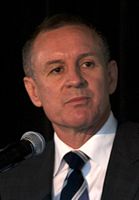South Australian state election, 2014
|
|
||||||||||||||||||||||||||||||||||
|---|---|---|---|---|---|---|---|---|---|---|---|---|---|---|---|---|---|---|---|---|---|---|---|---|---|---|---|---|---|---|---|---|---|---|
|
||||||||||||||||||||||||||||||||||
|
All 47 seats in the South Australian House of Assembly 24 seats were needed for a majority 11 (of the 22) seats in the South Australian Legislative Council |
||||||||||||||||||||||||||||||||||
|
||||||||||||||||||||||||||||||||||
|
||||||||||||||||||||||||||||||||||
The 2014 South Australian state election elected members to the 53rd Parliament of South Australia on 15 March 2014, to fill all 47 seats in the House of Assembly (lower house) and 11 of 22 seats in the Legislative Council (upper house). The 12-year-incumbent Australian Labor Party (SA) government, led by Premier Jay Weatherill, won its fourth consecutive four-year term in government, a record 16 years of Labor government, defeating the opposition Liberal Party of Australia (SA), led by Opposition Leader Steven Marshall.
The election resulted in a hung parliament with 23 seats for Labor and 22 for the Liberals. The balance of power rested with the two crossbench independents, Bob Such and Geoff Brock. Such did not indicate who he would support in a minority government before he went on medical leave for a brain tumour, diagnosed one week after the election. University of Adelaide Professor and Political Commentator Clem McIntyre said the absence of Such virtually guaranteed that Brock would back Labor – with 24 seats required to govern, Brock duly provided support to the incumbent Labor government, allowing Weatherill to continue in office as head of a minority government. McIntyre said:
...
Wikipedia


